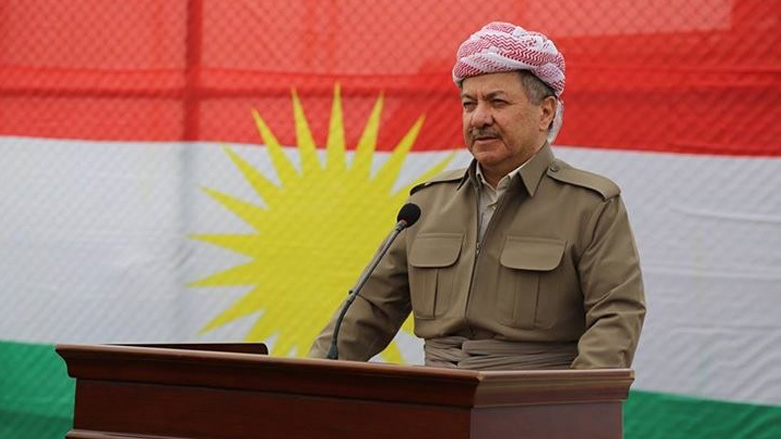Barzani: Erbil-Baghdad relations should undergo 'thorough review'

ERBIL (Kurdistan 24) - After the official announcement of last week's Iraqi parliamentary elections, Former President of the Kurdistan Region Masoud Barzani announced on social media on Saturday that he hoped that the relations between Erbil and Baghdad will be reviewed and that the two would proceed toward common goals.
“Now that the elections for Iraq's Council of Representatives have been conducted and completed, it is my sincere hope that the Erbil-Baghdad relations will undergo a thorough review in pursuit of a mutually-beneficial path,” Barzani tweeted on his official Twitter account on Saturday morning.
“After nearly a century of injustices, it is imperative that Baghdad begins to fathom our righteous cause. We find it fitting to continue, through dialogue our relations until we reach a solution. If the political entities of Kurdistan remain united, then we will succeed at protecting our people's rights,” he wrote in his second tweet.
In a statement released on his official website, Barzani stated the main cause of all issues between the two sides and the motivation to hold September's independence referendum has been Baghdad’s lack of commitment to the Iraqi Constitution.
He justified the referendum by quoting the preamble of the constitution. “The adherence to this Constitution preserves for Iraq its free union of people, of land, and of sovereignty.”
Barzani explained that Iraq is made of a free union and that referendum and self-determination is a constitutional and natural right of people of the Kurdistan Region.
He stated that 100 years of ‘catastrophic experience’ must have made Baghdad understand that it should not be against the rights of Iraq's Kurds and should understand their cause.
“It is a good opportunity for the top Iraqi parties to deal with the rights and demands of the Kurdistan Region’s people based on the Constitution,” Barzani said.
He noted that the federal government of Iraq should have compensated the people of the Kurdistan Region rather than imposing collective sanctions, referring to Baghdad’s reaction following the referendum, in which it disputed territories were taken militarily and various punitive measures, such as an international flight ban, were enacted.
That Iraqi government should compensate the people of the Kurdistan Region for the previous campaigns of Anfal, he added, speaking of Saddam Husein's murderous campaign of chemical attacks, mass displacement, and the destruction of thousands of villages. He also mentioned the recent post-referendum actions against the people in Kirkuk, Tuz Khurmatu, and other areas.
“We believe it is better to continue dialogue with Baghdad until we reach a solution. War has never been our option,” the Kurdish leader continued. “Unfortunately, in all stages, it was Baghdad who chose war, and we defended, including the Oct. 16 [2017] incident.”
Barzani said that the Kurdistan Region, before and after the referendum, has always stressed that issues should be addressed far from violence as well as making peaceful relations with Baghdad.
“The situation that has been imposed by force and weapon in Kirkuk and other Kurdistani areas outside of the Kurdistan Region must end. History has shown that yes we would not bow, and the will of people of the Kurdistan Region has never been broken, and it will never be.”
The former Kurdish President also called on Iraq’s Independent High Electoral Commission (IHEC) to take steps to resolve the concerns of some parties regarding the May 12 vote.
Barzani also called on the Kurdistan Region’s parties to prioritize national interests. “We should understand that Kurdistan can protect its rights, and achieve more if we become united,” he said, calling parties to have a united voice in Baghdad.
Barzani has been the President of the Kurdistan Region from 2005 until 2017. After the referendum, he rejected the notion of extending his presidential term, as he had done in earlier years.
He has been the leader of the ruling Kurdistan Democratic Party (KDP) since 1979, following the death of his father Mullah Mustafa Barzani, a giant to many in the historic struggle for the Kurdish nation.
As a member of the Peshmerga, a Kurdish term meaning "Those who face death," Masoud Barzani has taken part in campaigns against former Iraqi regimes in the mountains of Northern Iraq. He has repeatedly expressed his pride at serving in such a capacity and stated that he would continue to remain as part of the Peshmerga.
Barzani was the driving force behind holding the historic referendum on independence in the Kurdistan Region on Sep. 25, 2017, which saw an overwhelming majority favoring statehood.
Since his resignation in November, Barzani officially holds no governmental post but remains the leader of the KDP, the largest and most influential party in the Kurdistan Region.
Editing by John J. Catherine
